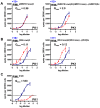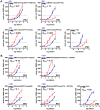Acquisition of drug resistance and dependence by prions
- PMID: 23408888
- PMCID: PMC3567182
- DOI: 10.1371/journal.ppat.1003158
Acquisition of drug resistance and dependence by prions
Abstract
We have reported that properties of prion strains may change when propagated in different environments. For example, when swainsonine-sensitive 22L prions were propagated in PK1 cells in the presence of swainsonine, drug-resistant variants emerged. We proposed that prions constitute quasi- populations comprising a range of variants with different properties, from which the fittest are selected in a particular environment. Prion populations developed heterogeneity even after biological cloning, indicating that during propagation mutation-like processes occur at the conformational level. Because brain-derived 22L prions are naturally swainsonine resistant, it was not too surprising that prions which had become swa sensitive after propagation in cells could revert to drug resistance. Because RML prions, both after propagation in brain or in PK1 cells, are swainsonine sensitive, we investigated whether it was nonetheless possible to select swainsonine-resistant variants by propagation in the presence of the drug. Interestingly, this was not possible with the standard line of PK1 cells, but in certain PK1 sublines not only swainsonine-resistant, but even swainsonine-dependent populations (i.e. that propagated more rapidly in the presence of the drug) could be isolated. Once established, they could be passaged indefinitely in PK1 cells, even in the absence of the drug, without losing swainsonine dependence. The misfolded prion protein (PrP(Sc)) associated with a swainsonine-dependent variant was less rapidly cleared in PK1 cells than that associated with its drug-sensitive counterpart, indicating that likely structural differences of the misfolded PrP underlie the properties of the prions. In summary, propagation of prions in the presence of an inhibitory drug may not only cause the selection of drug-resistant prions but even of stable variants that propagate more efficiently in the presence of the drug. These adaptations are most likely due to conformational changes of the abnormal prion protein.
Conflict of interest statement
The authors have declared that no competing interests exist.
Figures










Similar articles
-
Transfer of a prion strain to different hosts leads to emergence of strain variants.Proc Natl Acad Sci U S A. 2010 Dec 28;107(52):22653-8. doi: 10.1073/pnas.1013014108. Epub 2010 Dec 14. Proc Natl Acad Sci U S A. 2010. PMID: 21156827 Free PMC article.
-
Mutability of prions.EMBO Rep. 2011 Dec 1;12(12):1243-50. doi: 10.1038/embor.2011.191. EMBO Rep. 2011. PMID: 21997293 Free PMC article.
-
Abrogation of complex glycosylation by swainsonine results in strain- and cell-specific inhibition of prion replication.J Biol Chem. 2011 Nov 25;286(47):40962-73. doi: 10.1074/jbc.M111.283978. Epub 2011 Sep 19. J Biol Chem. 2011. PMID: 21930694 Free PMC article.
-
Emergence and natural selection of drug-resistant prions.Mol Biosyst. 2010 Jul;6(7):1115-30. doi: 10.1039/c004550k. Epub 2010 Apr 27. Mol Biosyst. 2010. PMID: 20422111 Free PMC article. Review.
-
Prions on the move.EMBO Rep. 2011 Oct 28;12(11):1109-17. doi: 10.1038/embor.2011.192. EMBO Rep. 2011. PMID: 21997298 Free PMC article. Review.
Cited by
-
Artificial strain of human prions created in vitro.Nat Commun. 2018 Jun 4;9(1):2166. doi: 10.1038/s41467-018-04584-z. Nat Commun. 2018. PMID: 29867164 Free PMC article.
-
The many shades of prion strain adaptation.Prion. 2014 Mar-Apr;8(2):169-72. doi: 10.4161/pri.27836. Epub 2014 Feb 11. Prion. 2014. PMID: 24518385 Free PMC article.
-
Evidence of a novel α-synuclein strain isolated from a Parkinson's disease with dementia patient sample.Acta Neuropathol Commun. 2025 Aug 18;13(1):177. doi: 10.1186/s40478-025-02093-x. Acta Neuropathol Commun. 2025. PMID: 40826134 Free PMC article.
-
Use of a 2-aminothiazole to Treat Chronic Wasting Disease in Transgenic Mice.J Infect Dis. 2015 Jul 15;212 Suppl 1(Suppl 1):S17-25. doi: 10.1093/infdis/jiu656. J Infect Dis. 2015. PMID: 26116725 Free PMC article.
-
The role of prion strain diversity in the development of successful therapeutic treatments.Prog Mol Biol Transl Sci. 2020;175:77-119. doi: 10.1016/bs.pmbts.2020.07.001. Epub 2020 Aug 28. Prog Mol Biol Transl Sci. 2020. PMID: 32958242 Free PMC article. Review.
References
Publication types
MeSH terms
Substances
Grants and funding
LinkOut - more resources
Full Text Sources
Other Literature Sources
Research Materials

